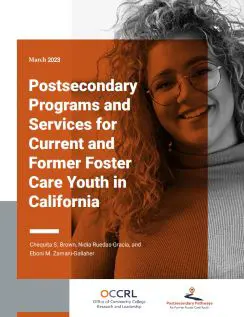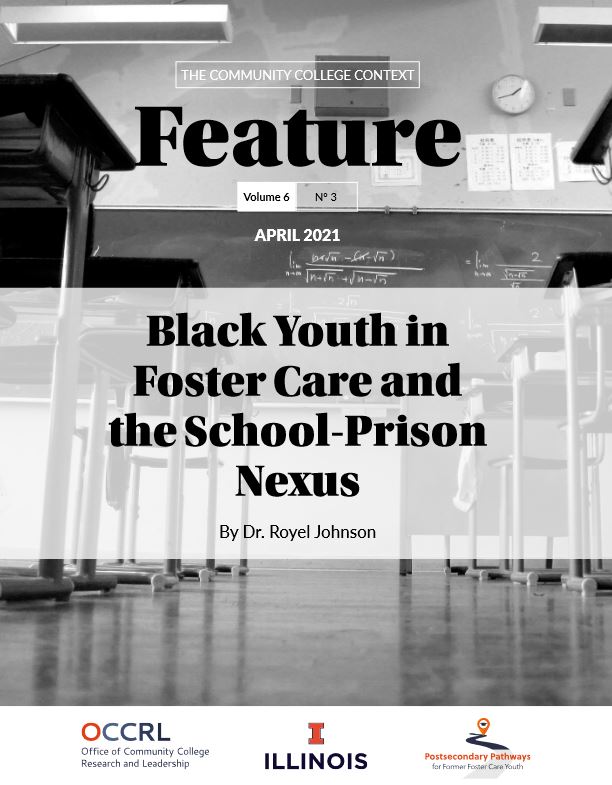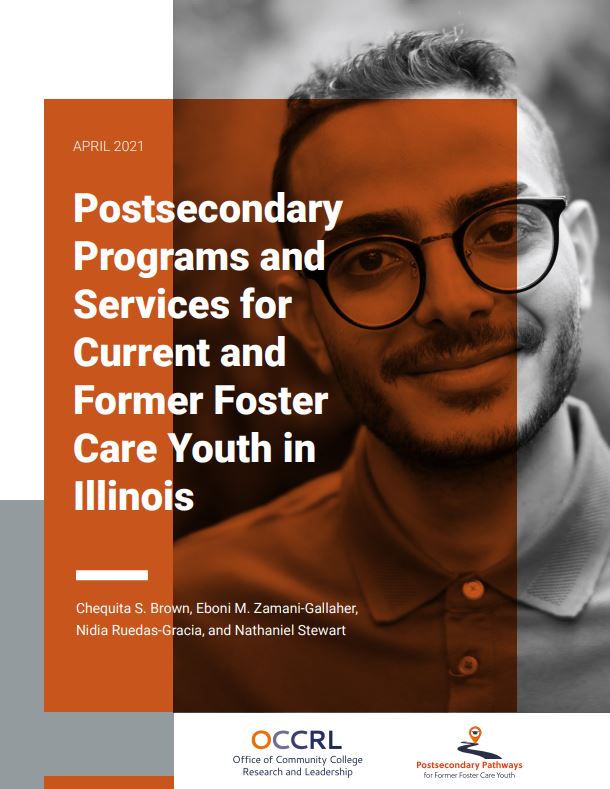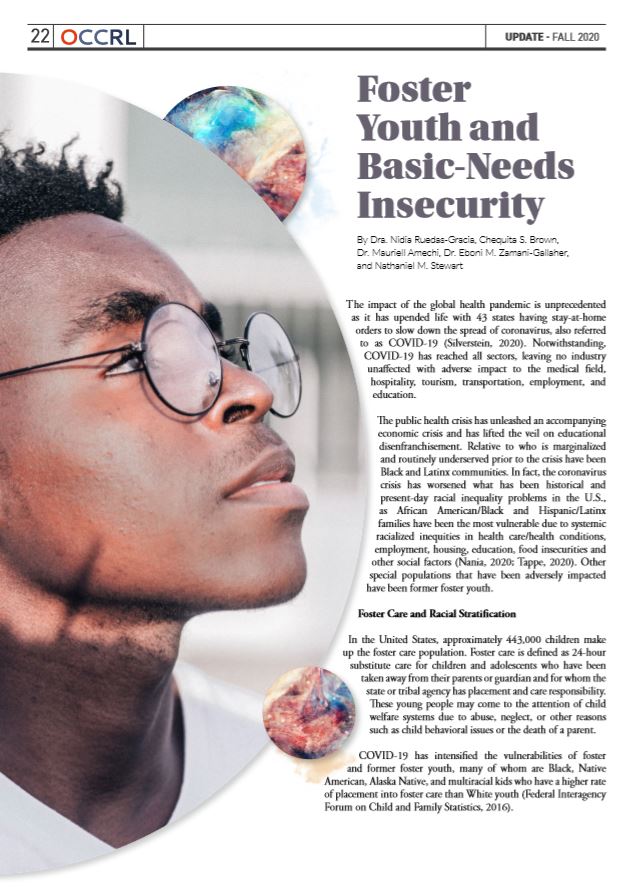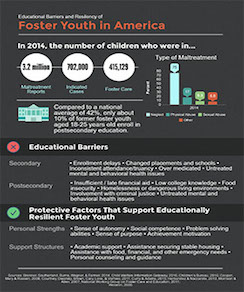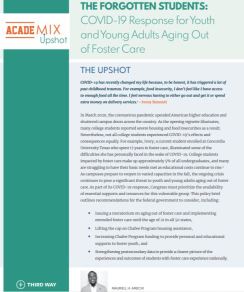Summary
The Postsecondary Pathways for Former Foster Care Youth (PP-FFCY) reflects OCCRL’s commitment to examining and developing postsecondary pathways that support mobility for first-generation, underserved, and minoritized populations, as well as strengthening career pathways to promote seamless transitions from college to careers. This project endeavors to examine postsecondary access, opportunities, and supports for foster youth in Illinois and other states across the county in addressing access and outcomes of FFCY in Career Technical Education (CTE).
Purpose
The Postsecondary Education Pathways for Former Foster Care Youth (PP-FFCY) project is an exploratory study focused on postsecondary pathways for current and former foster youth in Illinois. OCCRL is conducting a comprehensive-needs assessment that provides a descriptive profile of current and former foster youth populations in Illinois; examines postsecondary access, opportunities, and supports for foster youth in Illinois; and addresses disparities in career and technical education (CTE) programs. This project reflects OCCRL’s commitment to examining and developing postsecondary pathways that support mobility for first-generation, underserved, and minoritized populations as well as strengthening and supporting career pathways to promote seamless transitions from college to careers.
Resources
OCCRL aims to increase postsecondary awareness, access, and attainment for current and former foster care youth by providing information on programs and other resources that offer holistic support and services. View the list of postsecondary programs and services.
Podcasts
Strategies to Cultivate a Foster-Friendly Culture on Community College Campuses
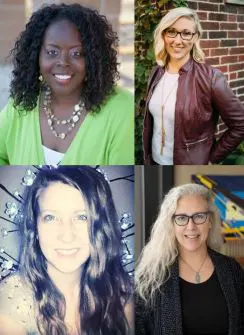 In this episode, Chequita Brown talks with Kate Danielson of the organization Foster Progress, as well as with Anna Wandtke and Tricia Wagner of Rock Valley College in Rockford, Illinois. The group discusses how to cultivate a foster-friendly culture at Illinois community colleges.
In this episode, Chequita Brown talks with Kate Danielson of the organization Foster Progress, as well as with Anna Wandtke and Tricia Wagner of Rock Valley College in Rockford, Illinois. The group discusses how to cultivate a foster-friendly culture at Illinois community colleges.
Navigating College as a Foster Care Alum
 In this episode, OCCRL research assistant Chequita S. Brown talks with Jonathan Stacy, a sophomore at Heartland Community College who is pursuing his studies and a possible career in criminal justice.
In this episode, OCCRL research assistant Chequita S. Brown talks with Jonathan Stacy, a sophomore at Heartland Community College who is pursuing his studies and a possible career in criminal justice.
Listen to the podcast and view the transcript.
Key Elements to Successfully Connecting Foster Care Youth to Educational Resources for Postsecondary Success
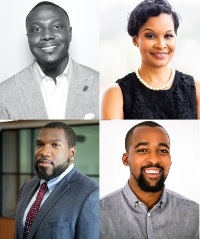 In this episode, Nathaniel Stewart talks with Mauriell Amechi, Regina Gavin Williams, and Blayne Stone Jr. about how the transitions and pathways to postsecondary education are similar and different for Black former foster care students. The scholars also discuss key elements to successfully connect foster care youth to educational resources that help advance the postsecondary education opportunities for this student population.
In this episode, Nathaniel Stewart talks with Mauriell Amechi, Regina Gavin Williams, and Blayne Stone Jr. about how the transitions and pathways to postsecondary education are similar and different for Black former foster care students. The scholars also discuss key elements to successfully connect foster care youth to educational resources that help advance the postsecondary education opportunities for this student population.
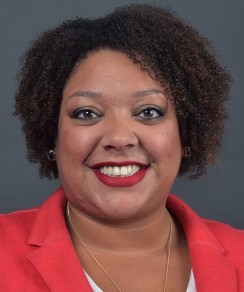
Maddy Day
The Impact of Campus-Based Support Programming on Foster Care Collegians' Postsecondary Access and Retention
In this episode, Chequita Brown of OCCRL talks with Maddy Day about the Fostering Success initiative in Michigan and the impact of campus-based support programming on foster carecollegians' postsecondary access and retention.

Patricia Palmer
How Youth-in-Care in Illinois Can Access Educational Resources to Pursue a Postsecondary Education
In this episode, OCCRL research assistant Chequita Brown continues the conversation on foster care youth by talking about with Patricia Palmer about accessing available resources in Illinois for youth-in-care who want to pursue a postsecondary education.
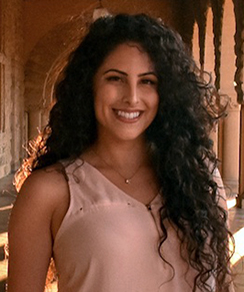
Nidia Ruedas-Gracia
Conceptualizing 'Sense of Belonging' Among Students From Historically Minoritized Racial Groups Within Higher Education
In this episode, Colvin Georges Jr., a research associate at OCCRL, talks with Dr. Nidia Ruedas-Gracia about what it means to have a sense of belonging and discusses her research in this area. They also discuss how a sense of belonging affects college students from historically minoritized racial groups.
Publications
Postsecondary Programs and Services for Current and Former Foster Care Youth in California
By Chequita S. Brown, Nidia Ruedas-Gracia, and Eboni M. Zamani-Gallaher
This brief highlights postsecondary programs and services in California that support youth in care, in addition to young adults who are aging out of foster care. Read more.
Tracking College-to-Career Pathways for Foster Youth
By Chequita S. Brown
In this OCCRL Thought Paper, Chequita S. Brown relates how tracking the data of students with foster care experience helps to recognize them as a legitimate student population. She offers recommendations on how to do this and conveys the many obstacles that can hinder the academic and career success of foster youth. Read more.
Black Youth in Foster and the School-Prison Nexus
By Royel Johnson
In this OCCRL Feature Brief, Dr. Royel Johnson argues that the foster care system, and more specifically congregate care facilities, are part and parcel to the enhancement of carceral state power. Read more.
Postsecondary Programs and Services for Current and Former Foster Care Youth in Illinois
By Chequita S. Brown, Eboni Zamani-Gallaher, Nidia Ruedas-Gracia, and Nathaniel M. Stewart
This research brief provides an overview of programs and services that helps strengthen postsecondary pathways for current and former foster youth in Illinois. Read more.
Foster Youth and Basic-Needs Insecurity
By Dra. Nidia Ruedas-Gracia, Chequita S. Brown, Dr. Mauriell Amechi, Dr. Eboni Zamani-Gallaher, and Nathaniel M. Stewart
This article discusses how COVID-19 has intensified the vulnerabilities of foster youth and former foster youth, many of whom are Black, Native American, Alaska Native, and multiracial children who have a higher rate of placement into foster care than White youth (Federal Interagency Forum on Child and Family Statistics, 2016). Read more.
(From the Fall 2020 UPDATE on Research and Leadership)
Exploring Equity in Postsecondary Education
By Heather L. Fox, Eboni M. Zamani-Gallaher
This chapter examines how postsecondary practitioners are encouraged to work collaboratively with child welfare agencies and other community-based organizations to identify and implement culturally responsive supports for former foster youth to promote early academic achievement. Read more.
The Forgotten Students: COVID-19 Response for Youth and Young Adults Aging Out of Foster Care
By Mauriell H. Amechi
This policy brief outlines recommendations for Congress to consider regarding the country's COVID-19 response, in an effort to prioritize the availability of essential supports and resources for youth and young adults who are aging out of foster care. Read more.
Voices and Viewpoints
Illinois Community College Board Offers Strategic Diversity, Equity, and Inclusion Initiatives
For more than 50 years, the Illinois Community College Board (ICCB) has supported public community colleges across the state by developing set policies to guide institutions in achieving local and statewide goals (ICCB, 2020). Historically, these policies have not always centered equity nor adequately addressed institutional and systemic barriers adversely affecting Illinois community college students, particularly those holding minoritized social identities.
ICCB has recognized these barriers and established multiple strategic initiatives relative to diversity, equity, and inclusion (DEI). To acknowledge ICCB’s work, I interviewed Dr. Marcus Brown, a Black male and the senior director for academic affairs and student services at the organization.
During our interview, Dr. Brown discussed several initiatives that address existing equity gaps for Black and Brown communities. These initiatives include the Workforce Equity Initiative, the Innovative Bridge and Transition Program, Program Review Illinois, and the Illinois Equity Initiatives Quarterly. Dr. Brown underscored the relevance of these resources by emphasizing the advancement of racial equity. Our talk concluded by recognizing that while ICCB has established vital programs to support disadvantaged communities, the work of anti-racism and cultivating inclusive collegiate environments is nowhere near done. There is still room for growth and improvement across the state.
Strategic Initiatives Relative to Diversity, Equity, and Inclusion (DEI)
ICCB has a number of strategic initiatives relative to DEI. The organization established a DEI committee and action plan, which allows it to be intentional and wholistic about its efforts to address racial equity gaps at Illinois community colleges. “The work that we do with colleges and on behalf of colleges has to be thoughtful,” Dr. Brown said.
ICCB offers several funding opportunities and programs to address racial equity gaps at community colleges in Illinois. An FY 2019 report noted that 37% of racially minoritized students completed their career and technical education (CTE) programs of study. However, only 12% were African American, demonstrating a critical need for training programs and support services for this population of students. The initiatives below are a select few, as noted from the interview with Dr. Brown.
Workforce Equity Initiative
Illinois community colleges, whose CTE programs of study focus on addressing identified workforce gaps and improving workforce equity among at-risk student populations (e.g., low-income and racially minoritized groups), are strongly encouraged to apply for the Workforce Equity Initiative Grant. Dr. Brown said that Illinois community colleges can apply for this grant and receive funding to offer training for unemployed students and provide them with the necessary skills needed for gainful employment. Institutions receiving this grant must provide target services to a minimum of 60% African Americans, per the Illinois Legislature and the Illinois Black Caucus guidelines.
Innovative Bridge and Transition Program
Racially minoritized students enter postsecondary education with varying levels of preparation. Some, particularly those with limited academic and English skills, do not have any preparation and require equitable support to succeed at the community college level, leading to gainful employment within in-demand occupations. ICCB acknowledges these realities and offers Illinois community colleges the opportunity to apply for the Innovative Bridge and Transition Program Grant. The objectives of this grant include partnerships with local employers, community-based organizations, advocacy groups, and more. Other aims include career planning, curricula focused on basic language skills, industry and occupation knowledge, and life skills. Through these goals, ICCB hopes to increase student completion among at-risk groups and improve the transition of these individuals into gainful employment.
Program Review Illinois (PRI)
ICCB coordinates a statewide review of CTE programs of study within Illinois community colleges. Program review is required once every five years for each program area. “The intent of this review process is to support [community] colleges in making campus-level planning and decision-making related to the quality, cost effectiveness, assessment, and improvement of programs” (Fox, Thrill, & Keist, 2018, p. 1). Institutions are asked specific questions related to their student populations, student satisfaction, measurement for student success, industry partnerships, recruitment strategies, the need for additional resources, equity gaps, and more. The program review manual is currently under review, and the next iteration will be released this year. The new version will have a stronger focus on identifying racial equity gaps through disaggregated data.
Illinois Equity Initiatives Quarterly
In partnership with the Illinois community college system and the Office of Community College Research and Leadership (OCCRL) at the University of Illinois at Urbana-Champaign, ICCB offers a newsletter providing agency updates, resources, and other information about successful DEI efforts. This publication provides a platform for community college students, faculty, and staff by sharing podcast episodes, blogs, webinars, events, and other publications. The featured stories and programs highlight the experiences of minoritized groups. Those who are interested in learning more about DEI efforts can subscribe here.
Equity Consciousness and Future Work
Dr. Brown noted that for ICCB to effectively advance racial equity across the state and increase student completion, his team must be consciously aware of the institutional and systemic barriers negatively affecting racially minoritized and low-income students. He referenced “data literacy” as an example by stating,
Many in the [ICCB] agency are called on to talk about reports, to talk about the data, and to make inferences about who is impacted by the data. But if you don’t understand equity, if you don’t understand how those gaps get created, and as a result, how to talk about how to remedy those gaps or to close those gaps or to make work meaningful in addressing those gaps, then we are still not prepared to do the work. So even something like data…has significant implications for the work that we are able to do and how we talk about our work.
ICCB is responsible for creating policies that Illinois community colleges operationalize on their campuses. These policies impact the experiences of Black and Brown students. Therefore, according to Dr. Brown, “As we look through the standards that we use, we also have to be thinking about what we are doing in our own work that addresses gaps that may be causing gaps.”
Moreover, ICCB is committed to continuous and ongoing professional development training for staff to identify racism and systemic inequities. It also relies on feedback from its Student Advisory Committee (SAC), which includes a racially diverse group of student leaders representing multiple Illinois community colleges. Their voices play an essential role in helping ICCB understand successes and areas of improvement related to academic programs of study, leadership development programming, and student advocacy and support.
Key Takeaways and Concluding Thoughts
As community colleges are thinking about strategic planning, ICCB encourages institutions to be equity conscious when considering the lives of racially minoritized and low-income student populations. According to Dr. Brown, “We need to be intentional about how we build DEI efforts in those strategic plans.” Community college stakeholders need to consider equity at all times by specifically identifying which student populations have access to specific CTE programs of study. They also need to actively work to close existing racial equity gaps and institutional barriers to success. Increased funding, grant opportunities, and workforce development programs are all additionally critical for advancing racial equity and expanding current programs and support services that assist at-risk and high-need student populations.
Additional Resources
- 2017 – 2021 Statewide Program Review Manual (Revised June 2019)
- Advancing Program Review: Evaluating and Envisioning the Future of Program Review at Illinois Community Colleges
- FY 2021 Innovative Bridge and Transition Program Grant Allocations
- FY 2021 Workforce Equity Initiative
- FY Workforce Equity Initiative FAQ
- Illinois Equity Initiatives Quarterly (January 28, 2021)
- Innovation Bridge and Transition Grant Application
- Innovative Bridge and Transition Grant FAQ
- Program Review FAQ
References
Fox, H. L., Thrill, C. R., & Keist, J. (2018). Advancing program review: Evaluating and envisioning the future of program review at Illinois community colleges. Office of Community College Research and Leadership, University of Illinois at Urbana-Champaign.
Illinois Community College Board. 2020. About ICCB.




